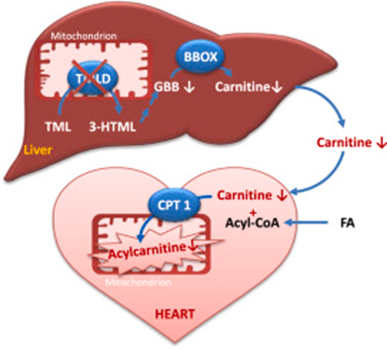#LIOS-001
SUMMARY
The TMLHE KO mouse (C57BL/6N) is a valuable model for studying lipid metabolism, mitochondrial dysfunction, and oxidative stress. With low acylcarnitines and reduced FAO, it enables cardiometabolic research, drug testing, metabolic reprogramming, and therapeutic screening.
BACKGROUND
This conventional (constitutive) TMLHE KO model (C57BL/6N background) is useful for research and drug development for diseases of lipid metabolism, oxidative stress, or mitochondrial dysfunction which is linked to over 50 chronic diseases. These include cardiovascular diseases, CNS, mitochondrial diseases and metabolic syndromes, aging and selective oncology cases such as prostate cancer and glioblastoma.
The TMLHE KO model can be used in testing L-carnitine and acylcarnitine-related conditions, as well as in drug target, and mechanism of action studies. TMLHE KO mice present present a cardio- and mitochondria-protective phenotype.
FEATURES AND KEY BENEFITS
Features
- Constitutive TMLHE KO on C57BL/6N background
- Reduced L-carnitine and acylcarnitine levels in blood and cardiac tissues
- Decreased fatty acid oxidation
- Cardio- and mitochondria-protective phenotype.
Key benefits
- Models cardiometabolic protection and metabolic reprogramming
- Useful for studying lipid metabolism, mitochondrial dysfunction, oxidative stress
- Supports drug target validation and mechanism-of-action studies
- Applicable in cardiovascular, CNS, metabolic, aging, and oncology research.
REFERENCES
[1] Liepinsh E, et al. Low cardiac content of long-chain acylcarnitines in TMLHE knockout mice prevents ischaemia-reperfusion-induced mitochondrial and cardiac damage. Free Radic Biol Med. 2021; 177:370-380. https://doi.org/10.1016/j.freeradbiomed.2021.10.035
[2] Liepinsh E, et al. Knockout of Tmlhe in mice is not associated with autism spectrum disorder phenotypes or motor dysfunction despite low carnitine levels. Mol Autism. 2023; 14(1):29. https://doi.org/10.1186/s13229-023-00560-7
AVAILABLE
for research collaboration.
CONTACT
Dr. Anna Stikāne: anna.stikane@osi.lv
Latvian Institute of Organic Synthesis, Aizkraukles Str. 21, Riga LV-1006, Latvia




